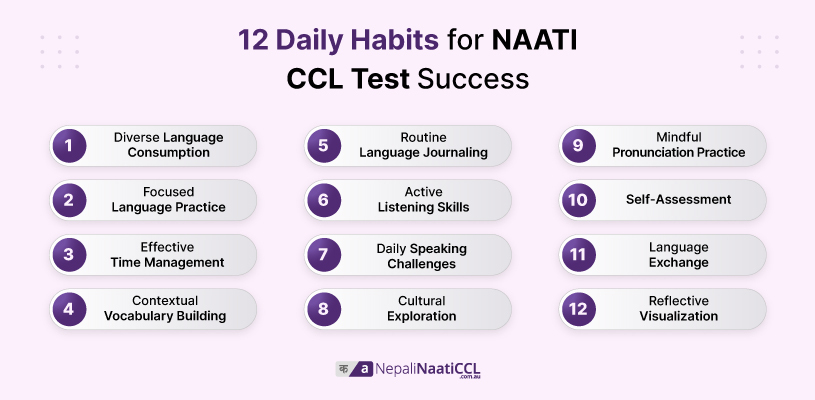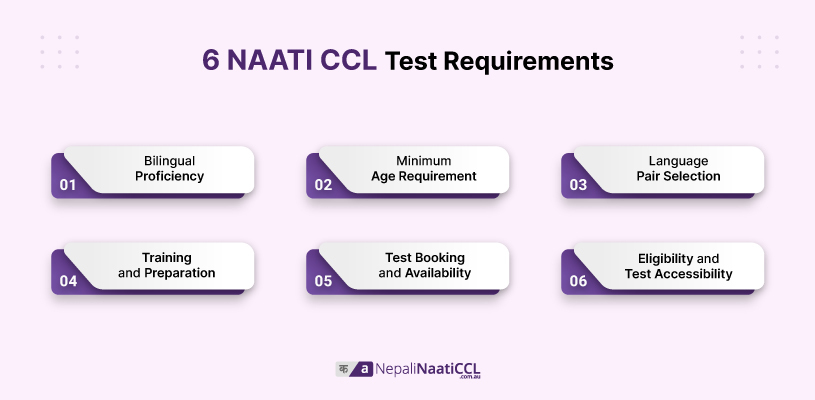Greetings! If you’re preparing yourself to ace the NAATI CCL test and earn five valuable Australian PR points, you’ve landed on the right page. This blog is your guide to 12 daily habits for NAATI CCL test success that can lead you to clear your NAATI CCL test on your first try.
Moving on, these habits aren’t just about passing a test; they’re about making you a better communicator overall and opening job prospects in the linguistic fields. Sure, learning and adapting can be hectic, but worry not. I will provide you with tips that can integrate these habits seamlessly into your daily routine.
Now, you might be wondering what might be the secret to mastering the NAATI CCL test? The answer lies in cultivating a set of daily habits that progressively sharpen your language proficiency and communication.
Let’s explore 12 daily habits for NAATI CCL success in this blog and make your test preparation journey fruitful.
NAATI CCL Test Overview
The NAATI CCL test is a significant milestone that serves as a proper validation of your language abilities. This test assesses your proficiency in not just one language but in a pair – English and another language of your choice.
Hence, It’s more than just knowing words; it’s about skillfully navigating communication.
Furthermore, the examination is structured into two distinct segments: dialogue interpreting and monologue interpreting. For the dialogue component, you will face a dynamic challenge where you listen to a conversation between two speakers in one language and then convey its essence in your chosen language.
On the other hand, the monologue segment will be a speech delivered in one language, which you then interpret into the second language. This phase tests your interpretive skills, demanding your full attention and quick mental processing.
Now, you might wonder about the ‘why’ behind this test’s significance. The NAATI CCL test holds the key to unlocking diverse immigration and linguistic opportunities.
Moreover, for those considering a move to Australia, success in the NAATI CCL test will help with acquiring five Australian PR points. These points can make a substantial difference in your migration journey.
In essence, the NAATI CCL test isn’t just an examination; it’s an opportunity to expand your horizons to several career prospects and immigration opportunities. Hence, developing proper habits for regular development is very vital throughout your preparation journey.
12 Daily Habits for NAATI CCL Test Success

Mastering the NAATI CCL test requires consistent effort and a strategic approach. Incorporating proper daily habits into your routine can significantly enhance your chances of success. Hence, the following are twelve daily habits for NAATI CCL test success.
1. Diverse Language Consumption
I suggest that you engage with a variety of language content daily. Reading news articles, listening to podcasts, and watching movies in your chosen languages expose you to different vocabulary, sentence structures, and cultural contexts.
By exposing yourself to diverse content, you expand your linguistic abilities and grasp the nuances of language use in real-life situations. This habit not only enriches your vocabulary but also enhances your ability to understand different accents and communication styles
2. Focused Language Practice
Regular, focused language practice is the secret to making your NAATI CCL test journey fruitful. Set aside dedicated time each day to engage in language-related tasks, such as translating short texts or interpreting dialogues from everyday conversations.
Moreover, these deliberate practice sessions sharpen your interpretation skills, helping you convey messages accurately. Through consistent practice, you build the muscle memory required for smooth interpretation and develop the confidence needed to clear the test.
3. Effective Time Management
In the hustle and bustle of daily life, effective time management can become your closest ally. Plan your study sessions wisely, breaking down your goals into achievable tasks.
Also, allocate time for listening exercises, speaking practice, and vocabulary building. A well-structured routine keeps you motivated.
Remember, effective time management helps you create a balanced approach, allowing you to do your best without sacrificing other commitments.
4. Contextual Vocabulary Building
Learning new words becomes more meaningful when you understand their context. Instead of memorizing isolated vocabulary lists, connect words to real-life situations. When you encounter a new term, explore its usage in sentences and examples.
Meanwhile, this practice embeds the word in your memory alongside its appropriate context. Contextual vocabulary building empowers you not just to use words but to convey messages accurately and fluently.
5. Routine Language Journaling
Keeping a language journal helps your linguistic growth exponentially. In this journal, jot down new phrases, expressions, and thoughts in both languages.
Moreover, reflect on your daily experiences and interactions. This practice reinforces your writing skills, refines your vocabulary, and develops your memory retention.
Over time, your journal becomes a personal language archive, helping you see your progress and serving as a source of inspiration. By nurturing this habit, you enhance your overall language proficiency and create a valuable resource for future reference.
6. Active Listening Skills
The art of active listening is a very essential skill for clearing the NAATI CCL test. Engage in regular exercises that challenge your listening skills, such as watching videos or listening to podcasts in your chosen languages.
Also, focus not only on understanding the words but also on capturing the tone, rhythm, and nuances of speech. This habit hones your ability to comprehend diverse accents and dialects, which is essential for excelling in the dialogue interpreting section.
Through active listening, you develop a heightened sensitivity to the intricacies of language, allowing you to interpret spoken content in real-time situations accurately.
7. Daily Speaking Challenges
Embrace daily speaking challenges as a vital component of your language journey. Set aside moments to engage in conversations or narrate stories in both languages.
Likewise, this consistent practice refines your fluency, pronunciation, and language flow. Speaking challenges also boost your confidence as they replicate the pressure of real-life interactions.
As you articulate thoughts and ideas aloud, you bridge the gap between comprehension and expression, ensuring that your linguistic skills are well-rounded and ready for the NAATI CCL test.
8. Cultural Exploration
Understanding the cultural context behind a language enhances your interpretation skills. Dive into the cultural backgrounds of your chosen languages by exploring literature, films, music, and traditions.
Cultural insights allow you to navigate idiomatic expressions and context-specific communication effectively.
Furthermore, this habit enriches your interpretations, ensuring that you convey not just the words but also the cultural nuances. By immersing yourself in diverse cultural landscapes, you become a more versatile and sensitive interpreter in various scenarios.
9. Mindful Pronunciation Practice
Clear and accurate pronunciation is the secret to effective interpretation. Dedicate time to practicing challenging words and sounds in both languages.
Moreover, pay attention to articulation, intonation, and stress patterns. This habit refines your ability to use words precisely, ensuring that your interpretations are easily understandable to others.
By mastering pronunciation, you boost your credibility as an interpreter and eliminate potential barriers to effective communication.
10. Self-Assessment
Regular self-assessment is a reflective habit that fine-tunes your learning journey. After each study session, review your progress and identify areas of strength and weakness.
Also, take note of phrases or concepts that were challenging and areas where you excelled. This self-awareness empowers you to tailor your daily practices to address specific challenges.
Additionally, tracking your progress helps improve your motivation by showcasing how far you’ve come. By focusing on self-assessment, you optimize your language learning experience and streamline your path to NAATI CCL test success.
11. Language Exchange
Engaging in language exchanges with native speakers or fellow learners offers authentic exposure to colloquial language use. Participate in conversations where you alternate between languages, providing practical experience in both interpretation and conversation.
Similarly, language exchanges expose you to real-life linguistic nuances and cultural idioms, which are invaluable for successful interpretation.
12. Reflective Visualization
Mental preparation is a powerful tool for success. Before tackling the NAATI CCL test, engage in reflective visualization.
Close your eyes and imagine yourself confidently interpreting dialogues and monologues in the test setting. Visualize yourself, maintaining composure, understanding the content, and conveying it with precision.
This practice enhances your self-assurance and performance on the actual test day. Hence, by fostering a positive mindset and rehearsing success in your mind’s eye, you build a strong foundation for a successful NAATI CCL test experience.
6 General NAATI CCL Test Requirements

To undertake the NAATI CCL test, you must learn all the general NAATI CCL test requirements and all the steps to make the NAATI CCL successful. These requirements cover your range of skills, typically focusing on fluency, vocabulary, and cultural nuances.
Hence, let’s explore six general NAATI CCL test requirements:
1. Bilingual Proficiency
To take and clear the NAATI CCL test, bilingual proficiency is one of the most essential requirements. This means having a strong command of both English and another language of your choice.
Also, your ability to comprehend, interpret, and convey messages accurately in both languages is at the heart of this test. The test assesses not just your vocabulary but also your fluency, pronunciation, and understanding of cultural nuances so that you can effectively bridge the language gaps.
2. Minimum Age Requirement
While there is no strict upper age limit, test candidates must be at least 18 years old to take the NAATI CCL test. This is to ensure that candidates have a certain level of maturity and life experience, which can contribute to their language interpretation skills.
Moreover, whether you’re a student, a working professional, or someone seeking new opportunities, the test is open to everyone.
3. Language Pair Selection
As the NAATI CCL test focuses on language pairs, you need to choose English and another language that you’re proficient in. You mustn’t be just conversational in both languages but capable of handling complex topics and nuanced communication.
Hence, this choice impacts both the dialogue interpreting and monologue interpreting sections, so selecting languages that align with your expertise is vital for your success.
4. Training and Preparation
While not a strict requirement, undergoing training or preparation for the NAATI CCL test is highly recommended. Joining coaching programs or accessing study materials designed for NAATI CCL test preparation can provide you with insights into the test format, interpretation techniques, and strategies to excel.
Furthermore, this training optimizes your chances of success, as it equips you with a systematic approach to tackle the challenges posed by the test.
5. Test Booking and Availability
NAATI CCL tests are conducted at various locations and can be booked according to your convenience. However, it’s important to be aware of test availability, especially during peak periods.
Likewise, booking your test well in advance ensures that you secure your preferred date and location. Additionally, stay updated with any changes or updates in the test schedule to ensure a smooth testing experience.
6. Eligibility and Test Accessibility
The NAATI CCL test is accessible to every language enthusiast. There are no strict prerequisites like formal education or prior language degrees.
Hence, whether you have formal language education or have acquired your language skills through immersion and practice, you’re welcome to participate in the test.
This accessibility promotes diversity and encourages individuals with a passion for languages to engage in the test preparation process.
Conclusion
In conclusion, mastering the NAATI CCL test isn’t just about passing an exam; it’s a transformative journey that opens doors to several career and migration opportunities.
Also, the twelve daily habits for NAATI CCL success we’ve explored will serve as a stepping stone toward your success. By embracing these habits, you’re nurturing a comprehensive language proficiency that extends beyond the test and enriches your interactions in a globalized world.
Moreover, to help you succeed in your journey, NepaliNAATICCL stands as an important online portal to cater to all your queries and needs regarding the NAATI CCL Online Test. This platform offers comprehensive NAATI CCL course materials, NAATI CCL mock tests, and invaluable free NAATI CCL test samples.
Along with NepaliNAATICCL, CCLHUB is also a leading platform in providing NAATI CCL guidance and premium study materials.
Hence, whether you’re seeking clarification on test requirements, looking for strategies to enhance your interpretation skills, or are eager to simulate the test environment through mock tests, NepaliNAATICCL is your go-to resource.
I hope you have learned something in this blog to help you with your NAATI CCL journey.
Happy Learning!
FAQ
Q.1: What is the NAATI CCL test, and why is it important for language enthusiasts?
The NAATI CCL test is a language proficiency examination that assesses your ability to interpret spoken content between English and another language. It holds significance as it opens doors to a multitude of linguistic career opportunities and adds five valuable Australian PR points, making it an essential step for those considering migration to Australia.
Q.2: How do the twelve daily habits contribute to NAATI CCL test success?
The twelve daily habits provide a systematic approach to language learning and test preparation. By incorporating these habits, you refine various aspects of your language skills, enhancing your overall proficiency and ensuring a complete preparation for the NAATI CCL test.
Q.3: What is NepaliNAATICCL, and how does it assist in NAATI CCL test preparation?
NepaliNAATICCL is an online portal that serves as a comprehensive resource for all aspects of the NAATI CCL Online Test. It offers guidance for the NAATI CCL test, including NAATI CCL course materials, meticulously designed mock tests, and free NAATI CCL test samples.
Q.4: Can I take the NAATI CCL test even if I don’t have formal language education?
Absolutely! The NAATI CCL test is designed to be inclusive, welcoming individuals from diverse language backgrounds. While formal education can be beneficial, it’s not a strict requirement. What matters most is your proficiency in both languages, your ability to interpret effectively, and your dedication to refining your language skills through practice and preparation.
Q.5: How do I book my NAATI CCL test, and what should I consider during the booking process?
Booking the NAATI CCL test involves selecting a suitable test date and location based on availability. It’s advisable to book well in advance to secure your preferred options. Keep an eye on test schedules and any updates to ensure a smooth testing experience. Additionally, consider factors like your personal commitments and study schedule when choosing the test date.





